THE EXPANSION OF IMPERIALISM
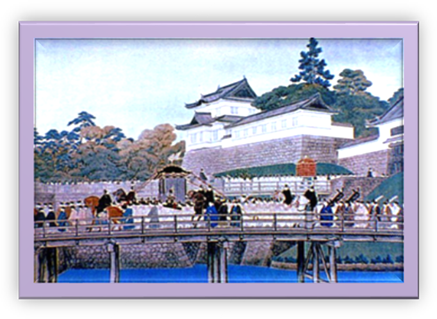
Unit
Overview
The
world’s industrialized nations quickly recognized that they needed raw
materials and new markets if they were to continue their economic success. The nations of the West competed to create colonies
in the underdeveloped regions of the world and became a force in Africa, Asia
and Latin America. This process became
known as imperialism. Their desire to
control additional territory grew from a strong sense of nationalism as well as
an obligation to further European values and religious beliefs. Books and newspapers inspired an interest in
distant places and a spirit adventure.
Let’s see how it all happened.
STOP:
Answer Section A Questions
New
Nations Upset the Old Balance
In
the decades following the American Revolution, many in Great Britain started to
feel that colonies were more trouble than they were worth. As a result, by the 1840’s, the British
government had granted both Canada and Australia a large portion of
self-rule. Yet, by the turn of the
century, Britain’s role in the world had changed, and controlling an empire
became more important than ever before.
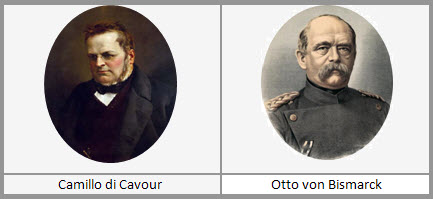
In
the first half of the nineteenth century, the nations of Europe attempted to
create a balance of power through a system known as the Concert of Europe. Statesmen
hoped to achieve stability and peace through diplomacy and alliances. However, in the second half of the nineteenth
century, this idealistic view was replaced by a philosophy of power politics
and violence known as Realpolitik. Camillo
di Cavour, a skilled practitioner of Realpolitik, succeeded in unifying Italy while Otto von Bismarck
created the nation of Germany using
the same principles. In the era
following the Civil War, the United
States experienced rapid growth and emerged as a contender in the expanding
industrial market. These three countries
represented a new political and economic challenge for the established nations
of Europe. Citizens developed a loyalty to and love for their individual
countries which became known as nationalism. This new form of national pride encouraged
competition and bitter rivalries.
STOP: Answer Section B Questions
The
Race for Colonies
The
British soon found themselves in an intense struggle for economic
supremacy. Countries that had once
bought their products willingly were now adding taxes in the form of tariffs in
order to protect their own industries.
It was necessary for the British to retain their pre-existing markets
and to find new ones if they were to remain a world leader. New industries required a variety of raw materials that colonies
supplied. Businessmen also hoped lands
under British rule would provide new markets and new customers for their
manufactured goods. Extending the empire
also gave Great Britain the ability to protect trade routes which were also
necessary if the British were going to avoid an economic downturn.
Britain
believed establishing colonies for prestige and profit was the answer to this
dilemma. This quest for colonial empires
in order to gain political, economic and military power became known as imperialism. Other countries followed Great Britain’s
lead, and the race for colonies began in earnest. Countries that had colonies set out to
increase their empires, and countries that had no colonies were determined to
acquire them. By 1900, the French had
established an empire second only to Great Britain, and the Dutch expanded
their control over lands outside of Europe.
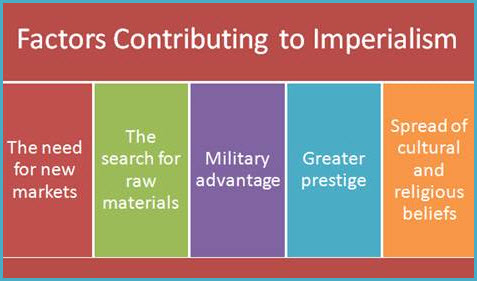
Both
Portugal and Spain tried to build new empires to replace their former
holdings. Russia moved into Central Asia
and Siberia while Austria-Hungary exerted its influence in the Balkan states. Belgium and Italy also became competitive for
colonies in both Africa and Asia. The
Germans invested in building a railroad from Berlin to Baghdad with the hope of
establishing a presence in the Middle East.
Japan and the United States also became involved in expansion beyond
their borders at this time. The
development of the rapid-firing machine gun gave the military forces of the
industrialized nations a distinct advantage.
Quinine provided protection
against malaria which had often been fatal for Europeans in the past. Distance was no longer a limiting factor. Steam ships, telegraph lines, railroads and
other inventions permitted nations to keep in touch with their colonies in
spite of the miles that separated them.
STOP: Answer Section C Questions
Profit
was not the Only Motive
However,
profit was not the only motive that inspired the race for colonies. European nations believed that additional
territory increased their prestige and status.
Some countries claimed land that offered very little economic benefit
simply to have a greater presence on the world map. Europeans were also convinced that they had
an obligation to carry the progress and the achievements of the Industrial
Revolution to areas of the world which they considered to be primitive. Christian
missionaries also pushed for expansion because they believed that European
rule was the best way to end practices such as the slave trade.
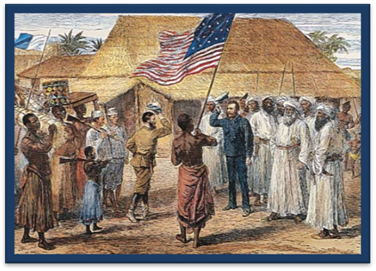
Stanley and Livingstone in Africa
Newspapers,
books and poetry also served to draw the average person into the imperialistic
view. An American newspaper hired Henry Stanley to travel to Africa and
look for David Livingstone. Livingstone had ventured into the interior of
Africa to find evidence against the slave trade and had not been heard from for
several years. Stanley found
Livingstone, interviewed him, and made headlines around the world. His articles captured the imagination and
interest of readers everywhere. Both
children and adults were equally fascinated by works of Joseph Rudyard Kipling who wrote stories and poems often set in
India. Although Kipling’s writings
sparked a true spirit of adventure, they also promoted an image of European
superiority and the concept that the European ways were best.
STOP: Answer Section D Questions
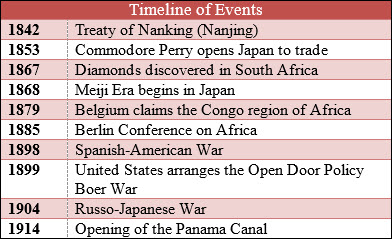
The
Scramble for Africa
The
nations of Western Europe as well as the United States and Japan were
determined to exert their power and influence.
As a result, imperialism changed life and altered the environment on
almost every continent. Some of the most
intense competition for colonies occurred in Africa. In 1875, Europeans
controlled ten percent of the continent.
Twenty-five years later, ninety percent of Africa was under some form of
colonial rule. The struggle intensified
in 1879 when Henry Stanley returned to Africa and claimed much of the interior
for King Leopold II of Belgium. Suddenly, the tiny nation controlled an area
that was eighty times larger than the country itself and referred to its new
acquisition as the Belgian Congo.
Not
to be outdone, Spain, Portugal, the Netherlands, Italy, Germany and Britain
hurried to carve African territory for themselves. To prevent a war over colonial interests in
this region, European countries sent representatives to Berlin in 1885 to establish
ground rules for their presence in Africa.
As a result, nations could claim land in Africa by simply sending troops
to control strategic locations. It is
also important to note that no African leaders were invited to participate in
these discussions. The map pictured here
shows the impact of this policy.
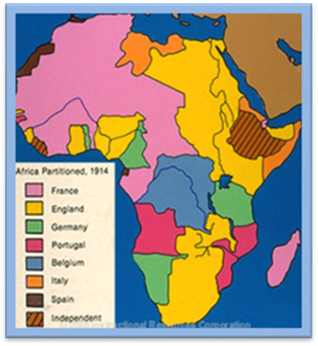
The Partition of Africa in 1914
Although
Ethiopia and Liberia remained independent, the rest of Africa was quickly
divided among the nations of Western Europe.
Some industrialists thought that Africans would soon be purchasing goods
manufactured in Europe in large quantities.
However, most of these sales never materialized since the tropical climate
simply made European clothes impractical.
The real financial benefit came from the abundance of natural resources
and commercial plantations. Cocoa, rubber and palm oil were grown
as cash crops and significant exports.
The French controlled West Africa,
and the British managed the land near the Suez
Canal to protect their access to India. The Belgian Congo contained massive deposits
of tin, copper and manganese, but
these would seem small in comparison to the discovery of gold and diamonds in South
Africa. It was the domination of the southern tip of
the continent that would prove invaluable.
When
the British took control of the Cape of
Good Hope in 1806, a small group of Dutch settlers, who called themselves Boers, were already living there. They resented British authority and wanted
their own government. Large numbers of
Boers made their way further into the interior on a journey called the Great Trek. They came into conflict with the Africans or
Zulus, and the two groups fought for several years. After defeating the Zulus, the Boers set up
three small states named Transvaal, the
Orange Free State and Natal. Within
a short time, the British annexed Natal but permitted the other two countries
to remain independent.
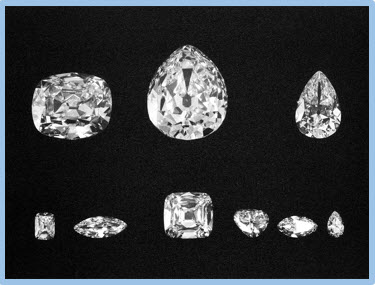
Diamonds Mined in South Africa
In
1867, Britain’s attention was directed toward a new venture. Diamonds were discovered on a farm near the
village of Kimberly located on the
border of the Orange Free State. British
miners made their way to the Boer lands in ever-increasing numbers, especially
after gold was discovered in the Transvaal in 1886. Tensions escalated, and the Boers declared
war against the British in 1899.
Although the Boers were outnumbered, they were successful in their use
of guerrilla tactics against the British army.
The British struck back by destroying Boer farms and food supplies, and
the Boers had little choice but to make peace.
In an effort to prevent further turmoil, the British permitted the
Dutch-speaking farmers to keep their own language and helped them rebuild their
farms. Native Africans, whose farms had
also been destroyed, were ignored. Soon
the Kimberly diamond fields, controlled by Cecil
Rhodes, were producing ninety percent of the world’s diamonds.
STOP: Answer Section E Questions
Spheres
of Influence in China
When
the nineteenth century began, China
was a prosperous, self-sufficient country.
In spite of its growing population, the Chinese developed an efficient
agricultural system. China believed that
products manufactured in Europe and the United States were inferior. As a result, the Chinese only permitted
European ships at the port city of Canton
(Guangzhou) and had little interest in what the outsiders had to offer. Europeans were determined to find something
the Chinese would buy. Unfortunately,
the product proved to be opium. Made from the poppy plant, this
highly-addictive drug created a major problem.
The
Chinese repeatedly requested that the nations of Europe stop the opium trade,
but Europe ignored these pleas. In an
attempt to use force, China began the Opium
War but was quickly defeated by the superior power of the British
navy. The Treaty of Nanking (Nanjing) ended the war but humiliated
China. China was required to open four
additional cities as trading ports and to pay for any opium that was destroyed
during the war. British citizens who did
business in china were granted extraterritorial
rights which meant they did not have
to obey Chinese laws.
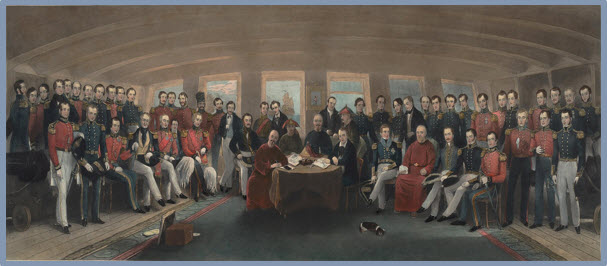
Signing the Treaty of Nanking
Problems
continued to mount for the weakening Chinese government. For example, the agricultural system could no
longer keep up with the ever-expanding population. Meanwhile, European countries as well as
Japan established spheres of influence. These were areas of the country where a
specific foreign nation controlled the business interests and resources. The United States became increasingly
concerned that it would be shut out of the vast Chinese market. Therefore, the Americans proposed the Open Door Policy in 1899. As a result, China was not divided into
traditional colonies, and all nations were welcome as traders. In spite of this practice, the Chinese were
still at the mercy of foreign influence.
STOP: Answer Section F Questions
Japan
Joins the Empire-builders
As
the search for new markets and trading partners continued, Japan captured the attention of Europe and North America by
1850. Having enjoyed a long period of
peace and stability, the Japanese had little interest in establishing contact
with the West. Dutch traders were
permitted to maintain an outpost near the city of Nagasaki, but the Japanese response was limited. This picture changed in 1853 when Commodore Matthew Perry arrived with
his American fleet and modern weapons.
The Japanese knew they were not strong enough to drive out these forces
so they quickly agreed to a treaty. The
Japanese feared their independence would soon be lost so they formed a plan to
combat the foreign threat. A group of
powerful new leaders overthrew the government and named a fifteen-year old boy Emperor Mutsuhito. His regime became known as the Meiji or Enlightened Rule, and its goal
was the modernization of Japan.
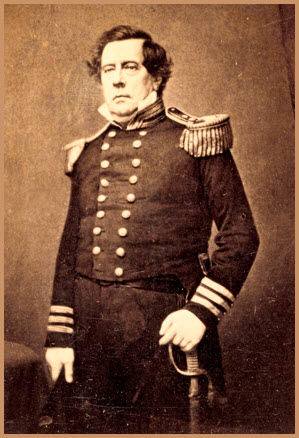
Commodore Matthew Perry
Dramatic
changes came quickly to Japan during the Meiji Era. Feudalism was abolished, a new constitution
was adopted and Japan sent representatives to industrialized countries to study
their progress. With government support,
Japan built factories, increased coal production and re-negotiated trade
agreements in their favor. They earned
money from the sale of traditional goods like silk and financed their
industrialization with the profits.
Unlike China, Japan did not owe large sums of money to European and
American bankers. The new leadership
also focused on a strong military. They
patterned their navy after the British fleet and the army after the German
model. Their success was apparent in the
Russo-Japanese War in 1904. Japan defeated Russia in this series of
battles, and Japan was able to create a sphere of influence in Manchuria, a Chinese province. The Japanese quickly followed the European
example of empire-building as a means to access natural resources and new
markets.
Imperialism
Goes Global
Imperialism
reached all corners of the world and became global in nature. The Industrial Revolution created a demand
for raw materials that drew attention to Latin
America as well as Asia and
Africa. Bolivian tin, Chilean copper and
Argentine beef caught the attention of industrialized nations. As Latin America increased its output of
these products, it realized it needed improved transportation in the form of
railroad lines and better communication links to be profitable. South American nations borrowed heavily from
European and American banks to finance these improvements. As a result, foreigners were soon able to
take over key mines and industries. The
United States, Latin America’s largest investor, feared European nations would
soon take over weakened governments in this region and used the Monroe Doctrine to restrict their
influence. The Spanish-American War gave the United States control over Cuba
as well as Puerto Rico and offered America the opportunity to assert its
authority.
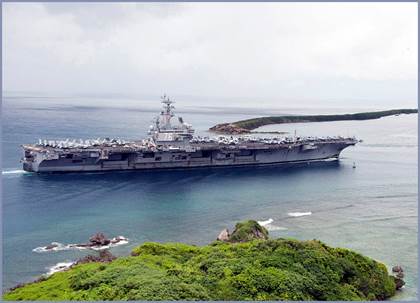
USS Ronald Reagan Docking in Guam
There
was also a fierce competition to control islands in the Pacific Ocean. An abundance of natural resources stirred an
interest in these territories, but their value as coal stations for steam
ships made them indispensable. The
settlement of the Spanish-American War awarded Guam to the United States; Britain, France, and Germany established
a presence there as well. By 1900,
nearly all the Pacific islands had lost their independence. Even the most remote parts of the world
became fair game for imperialists. The
early twentieth century produced a number of explorers who raced to Antarctica
to claim land for their respective countries.
STOP: Answer Section G Questions.
What Does
It All Mean?
Economic
gain, national pride and a desire to spread European values fueled the quest
for more territory and the rise of imperialism.
The decisions made by Western nations in the late nineteenth century
would prove to have serious consequences in the twentieth century. The competition for control of natural
resources led to increased tension, the threat of war and a disregard for the
environment. Millions of Asians,
Africans and Latin Americans were dominated by foreign powers which controlled
both the political and economic aspects of their lives. How would the indigenous people of the
non-industrialized nations react? Would
the ambitions of wealthy nations eventually lead to a major war? The decisions and events of the twentieth century
were shaped by these questions.
Additional Activities and Resources

The Meiji Restoration of 19th
Century Japan Article with Quiz
Writing Exercises: Imperialism I